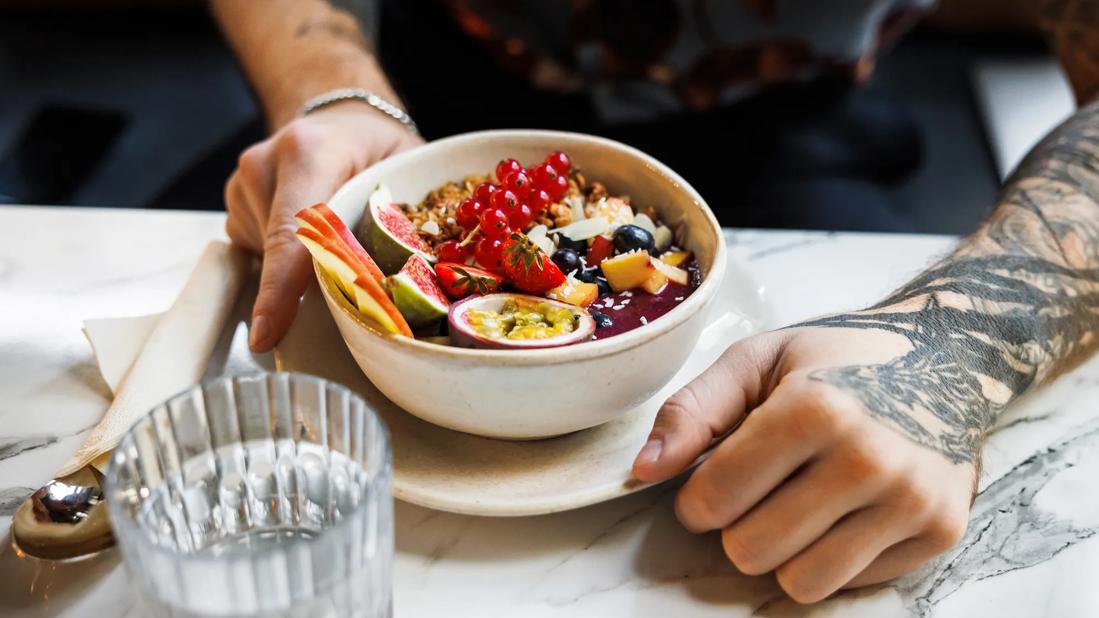This eating style has many health benefits, including weight loss, an improved microbiome, and increased nutrient and mineral consumption

Image content: This image is available to view online.
View image online (https://assets.clevelandclinic.org/transform/bacee4d1-583a-420f-8948-e3ca86b30342/eating-volume-foods-2042526297)
Person at table with a bowl filled with fruits and grains
An eating plan that emphasizes eating A LOT of food, not a little? It isn’t too good to be true — it’s the premise behind volume eating.
Advertisement
Cleveland Clinic is a non-profit academic medical center. Advertising on our site helps support our mission. We do not endorse non-Cleveland Clinic products or services. Policy
Volume eating is a way of eating rather than a specific diet. “With volume eating, you eat low-calorie, high-volume foods,” says registered dietitian Beth Czerwony, RD, LD. “Most of these foods are particularly high in water content, like fruits and vegetables.”
Unlike many diet trends, volume eating isn’t a fad. It’s just a style of eating. “I like to eat a lot of food,” shares Czerwony. “I don’t like to feel deprived or hungry. I want to be full, and I also want to be satisfied. With volume eating, you hit all of these.”
Volume eating is helpful for people who want to lose weight — and for anyone looking to get more healthy foods, fiber and nutrients in their diet.
Czerwony explains what volume eating is, its benefits and how to do it.
High-volume foods that have a lot of water or fiber, but are low in calories, include:
The great thing about eating high volume is that many different foods fit the bill, so you have plenty to choose from. “You can include any fruits, vegetables or whole grains that you enjoy,” says Czerwony.
Advertisement
“High-volume foods typically have a lot of water and fiber,” reiterates Czerwony. “The fluid and fiber slow digestion, making you feel fuller longer and helping control appetite.”
But volume eating goes beyond helping you feel full. It also satisfies your brain. “Eating is visual. If we eat what appears to be a large quantity — or volume — of food, our brains say, ‘Thank you for feeding me,’” Czerwony says. A large volume of food tells your brain that you’re safe from starvation, which can help turn off signals for hunger.
Volume eating works well for weight loss without any questionable diet gimmicks or special foods, powders or shakes.
"If you’re eating high volume, you’re more likely to hit the recommended five servings of fruits and vegetables a day,” notes Czerwony. Bumping up your fruits and veggies helps you reduce your overall calorie intake. “Reducing calories allows your body to go into your fat stores and burn fat for energy. So, if you’re doing this, you’ll likely end up losing weight,” she adds.
Czerwony says that volume eating has several potential benefits beyond weight loss, including:
“If you’re looking to improve your health, volume eating is a great way to do it,” says Czerwony. “You don’t even have to put a label on volume eating. You can simply look at it as eating a higher quantity of healthy foods.”
If you want to try volume eating, Czerwony recommends starting simple. For your meals, fill your plate with:
This plate strategy gives you a large volume of food without a lot of calories. It also avoids the common pitfall of making high-calorie carbs (like pasta) the largest part of the meal. “But you don’t have to eliminate any foods,” she clarifies. “You may just need to tweak the amounts of some foods.”
Czerwony says the simplicity of healthy eating often gets lost. It’s easy to see why, amid all the fad diets and strong opinions about the “right” way to eat. But following volume-eating principles can help reduce the confusion about healthy eating.
“People think eating well and losing weight have to be complicated,” says Czerwony. “Volume eating gets you back to basics, eating less processed foods and more healthy, identifiable whole foods.”
Advertisement

Sign up for our Health Essentials emails for expert guidance on nutrition, fitness, sleep, skin care and more.
Learn more about our editorial process.
Advertisement
Alternating between periods of eating and fasting may benefit your health
This plant-based eating plan focuses on lowering cholesterol, making it a great companion to the Mediterranean diet
Choose foods that are low in fiber and easy to chew and swallow
The flexible eating plan aims to boost your brain health by focusing on plant-based foods and limiting saturated fat
Designed to lower your blood pressure, this eating plan focuses on heart-healthy foods like whole grains, fruits and vegetables
Pescatarians don’t eat poultry, game or red meat, but they do eat fish and seafood, dairy and eggs
Research shows promising results from options like the DASH diet and Mediterranean diet
Studies show intermittent fasting may help you lose weight, improve blood pressure and more
Although it could be used as a moisturizer, this new trend is not recommended
Communicating clear limits helps protect your time, energy and emotional well-being
High cholesterol can be genetic, but testing and treatment can lower your heart disease risk